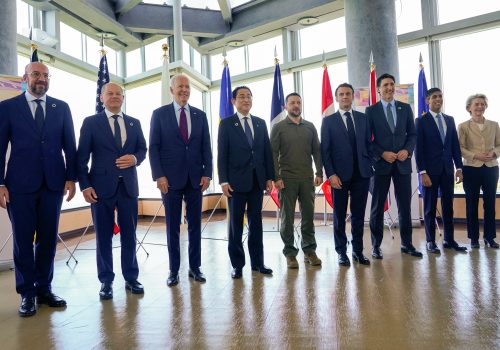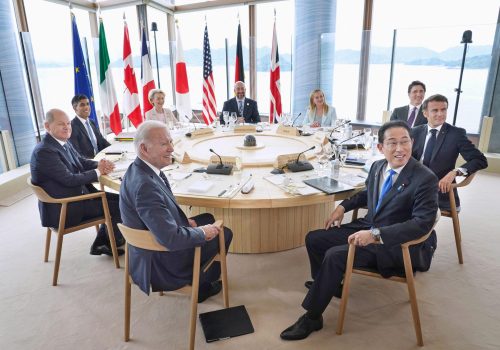The G7 needs a permanent secretariat. The 2024 elections cycle demonstrates why.
This “year of elections” has the potential to reshape global politics. At first glance, among the Group of Seven (G7) nations, there are only general elections scheduled in the United States and the European Union (EU). However, it is widely expected that the United Kingdom and Japan will likewise hold general elections this year, with multiple EU member states joining them, too.
These elections could change the foreign policy trajectory of the G7, even if key players such as US President Joe Biden and European Commission President Ursula von der Leyen retain their seats. At the same time, the G7 faces a slew of challenges. Among these are the emergence of a new “axis” among Russia, Iran, and North Korea, as well as the continued strategic challenge posed by China. There is also the potential for current progress on climate action to be derailed by climate-skeptic populist governments. Amid all of these challenges and more, the G7 must be able to continue its work as “a steering committee for the free world,” as US national security adviser Jake Sullivan described it.
To ensure the G7 stays the course amid potential future political upheavals, pools its staff resources, and develops a separate policymaking capacity alongside its presidency, it must commit to establishing a permanent secretariat.
In many ways, the G7 is already drifting toward establishing a permanent secretariat. The days in which the G7 was solely a “fly-in, fly-out” summit series ended with the onset of the COVID-19 pandemic, as G7 members made regular contact with each other to develop global health policy and address the global economic slowdown. This dynamic was further reinforced when G7 leaders held emergency meetings to coordinate their responses to Russia’s invasion of Ukraine. Nevertheless, as global security continues to deteriorate, from the emergence of the “coup belt” in Africa’s Sahel region to the twin threats of the Israel-Hamas war and Red Sea crisis, the G7 must maintain political inertia to head off these dangers. Meanwhile, the current G7 contact structures are insufficient for the tasks at hand.
A permanent G7 secretariat would offer several important benefits. Firstly, with the numerous elections taking place in 2024, policy continuity after changes in government will be vital for global security. This dynamic is especially visible with the growing debates in the US Congress over aid to Ukraine, Taiwan, and Israel. While a secretariat would not necessarily guarantee such aid, it would partially institutionalize such policies. Establishing an “institutional memory” in the G7 would enable members to develop more consistent strategies together, which will be vital to face the growing regional crises across the world. These crises, which were either instigated or exploited by the emerging Moscow-Tehran-Pyongyang axis, could even potentially benefit Beijing at the expense of G7 members if they do not maintain a steady and united approach.
Secondly, the expertise on intergovernmental and geoeconomic policy that the G7 needs is currently scattered throughout individual ministries and in international financial institutions such as the International Monetary Fund, Organisation for Economic Co-operation and Development, and Financial Action Task Force. Although contact groups between ministries and experts in the G7 have already emerged, these coordination platforms would strongly benefit from a permanent and centralized bureaucracy, especially under the continued oversight of an executive committee of the G7 “sherpas.” One G7 initiative that would benefit immensely from the oversight of a permanent staff is the Partnership for Global Infrastructure Investment, widely seen as the G7’s response to China’s Belt and Road Initiative, as the staff could coordinate more global large-scale sustainable development projects.
Thirdly, a secretariat could emerge as a policymaking body in its own right alongside the rotating G7 presidency. The G7’s occasional need to reconfigure its priorities and policies is evident through the return of its practice of external invitations, especially in the cases of outreach to leading Indo-Pacific democracies such as Australia and South Korea. Previously, these countries were invited to the 2008 and 2009 G8 summits, but due to the formation of the larger Group of Twenty (G20) forum in 2008, were not invited to subsequent G7 conferences until the 2021 summit. Oddly, Australia and South Korea were similarly not invited to attend the 2022 summit despite decisively assisting the G7 in enforcing sanctions on Russia and providing aid to Ukraine following Russia’s invasion. Without a secretariat, leading partners such as Australia and South Korea must rely solely on the incumbent G7 president to receive invitations. This is a mistake, especially when both have leading roles to play in promoting security in the Indo-Pacific region. In its role as a policymaking body, a G7 secretariat could contribute to promoting standing invitations to Australia and South Korea, which could open the option to expand the G7 to a G9 with them, as proposed by Biden’s former Chief of Staff Ron Klain.
A G7 secretariat could start small. In fact, the foundations for a G7 secretariat have already emerged out of the existing G7 contact and working groups. Annual (and sometimes biannual) G7 ministerial meetings work in tandem with expert working groups on topics ranging from science and innovation to countering democratic interference. Russia’s invasion of Ukraine also necessitated the establishment of the Russian Elites, Proxies, and Oligarchs (REPO) task force between the G7 members and Australia to enforce sanctions on the Kremlin. REPO could set a precedent for similar sanctions enforcement groups on North Korea and other rogue states under a permanent secretariat.
Granted, the G7’s informal structure is flexible, an advantage that it has often flexed. Its recent invitations to Australia and South Korea to the 2023 and 2024 summits prove this. Nevertheless, a secretariat would not necessarily hamper the political flexibility of the institution itself. It would merely provide a base from which the group could expand operations. Such an organizational dynamic would not be novel either. For example, the Association of Southeast Asian Nations established a secretariat decades before it adopted an official charter, using the founding Bangkok Declaration to set the secretariat’s operational objectives.
Regardless, the growing convergence of autocracies like those in Russia, Iran, and North Korea poses a growing threat to global security, while China’s potential as a rising revisionist power could eventually become an even bigger policy challenge. Moreover, even though the international community has made significant progress in reducing the rate of global warming, the climate crisis remains at a critical juncture.
The G7 must outmaneuver all these risks. The establishment of a G7 secretariat would cement the existing progress the G7 has made on stabilizing the global security situation and climate action, as well as provide a platform for further decisive actions to defend the community of democracies.
Francis Shin is a research assistant in the Atlantic Council’s Europe Center.
Further reading
Sun, May 21, 2023
G7 triumphs and the debt ceiling quagmire provide a glimpse into competing futures for US global leadership
Inflection Points By Frederick Kempe
A strong performance at the G7, juxtaposed with the United States' debt ceiling drama, highlights the challenges facing US international leadership.
Thu, Feb 29, 2024
It’s Italy’s time to cement itself as the indispensable Mediterranean nation
New Atlanticist By Kaush Arha, Paolo Messa
Italy is poised to be Europe’s linchpin for connecting the free and open economies of the Med-Atlantic and Indo-Pacific.
Sat, May 20, 2023
Experts react: A ‘game changer’ G7 summit in Japan
New Atlanticist By
As leaders of the Group of Seven countries gather in Hiroshima, Atlantic Council experts share their insights on what is coming out of the summit about Russia, China, the global economy, and more.
Image: Leaders of G7 countries head for the Memorial Cenotaph to the A-Bomb Dead at Hiroshima Peace Memorial Park in Hiroshima City, Hiroshima Prefecture on May 19, 2023. G7 Hiroshima Summit will be held from 19-21.( The Yomiuri Shimbun )


